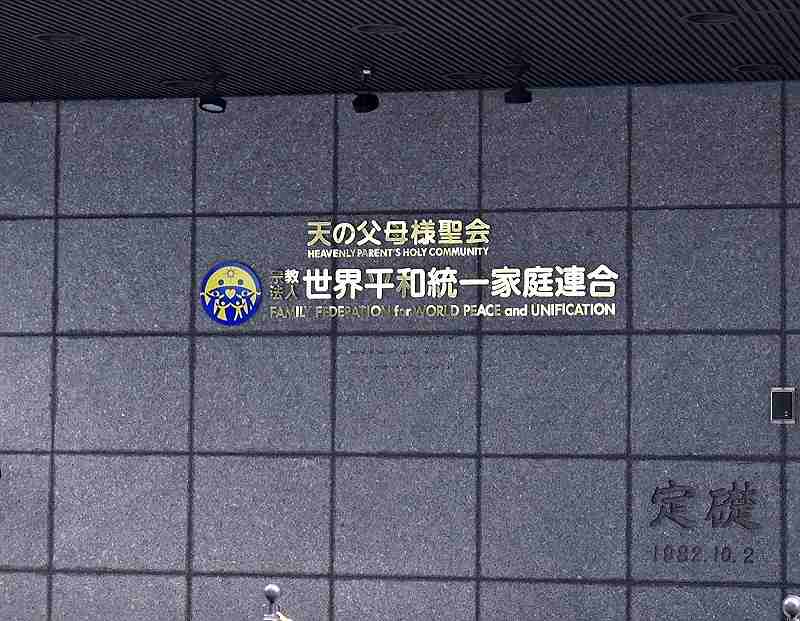Top Court Sets Terms for Judging Donation Solicitations;Lower Court to Decide if Unification Church Crossed Line

The Japan headquarters of the Family Federation for World Peace and Unification in Shibuya, Tokyo
17:02 JST, July 12, 2024
Conditions for determining the illegality of a religious organization’s donation solicitation practices were presented by the Supreme Court for the first time on Thursday when its First Petty Bench invalidated a document in which a now deceased follower of the Unification Church had promised not to sue for the return of her large donations.
In its ruling, the top court’s First Petty Bench said the document promising not to go to court to seek the return of the donations was “invalid” as it was “against public order and morals.” The top court also pointed out that the validity of the document had to be “decided very carefully” because the agreement not to take legal action constrained the constitutionally guaranteed “right of access to the courts.”
The top court ruled on a case filed as an appeal by the former follower’s daughter, who alleged the Unification Church, formally known as the Family Federation for World Peace and Unification, had forced her mother to make donations that were illegally solicited. The daughter is seeking compensation from the religious group.
The ruling was announced in a unanimous opinion by the five justices on the bench, with Justice Toru Sakai presiding. The court threw out rulings by the Tokyo District Court and the Tokyo High Court that had dismissed the plaintiff’s claim by deeming the renunciation of the right to sue to be valid. The Supreme Court sent the case back to the high court to consider whether there was illegality in the donation solicitation activities and whether the religious group was responsible for this solicitation.
The court said donation solicitation practices could be considered illegal in situations that do not correspond to social convention, based on consideration of a wide range of factors including the behavior and conduct used for solicitation, the attributes and home environment of the donor, the amount of the donations, and the assets and living conditions of the donor and their spouse and other family members.
In this case, the court noted that the former follower had gone as far as selling property to make donations to the group, and the amount of money given affected her day-to-day lifestyle. According to the ruling, the former follower, who died at 91 in 2021, donated more than ¥100 million to the Unification Church between 2005 and 2010 through such means as liquidating financial assets that had been in her husband’s name and selling property. The court concluded that the question of the illegality of the donation solicitation practices should be reconsidered by the high court.
In November 2015, when the follower was 86, she signed and sealed a document at a notary public office that said she would not file any lawsuit seeking compensation or to have the donations returned. The follower was diagnosed with dementia about seven months later.
Given the age of the follower, her relationship with the group and other factors, the court comprehensively considered the process by which the agreement was reached and the extent to which it disadvantaged the involved parties, and set a framework for deciding for the first time that the document would become invalid if the agreement “went against public order and morality.”
The former follower had been under the religious group’s psychological influence for many years. Given that she signed the document when she was elderly and was later diagnosed with dementia, and that she did so at the instruction of followers of the church, the top court said, “The group used the fact that the former follower could not make rational judgments and unilaterally caused a massive disadvantage to her.” Consequently, the court said the document should be invalidated.
This was the Supreme Court’s first ruling in a case involving donations to the Unification Church. The religious group said the ruling was a “regrettable result” and that it would restate the correctness of its assertions at the lower court.
Top Articles in Society
-

Producer Behind Pop Group XG Arrested for Cocaine Possession
-

Man Infected with Measles Reportedly Dined at Restaurant in Tokyo Station
-

Man Infected with Measles May Have Come in Contact with Many People in Tokyo, Went to Store, Restaurant Around When Symptoms Emerged
-

Woman with Measles Visited Hospital in Tokyo Multiple Times Before Being Diagnosed with Disease
-

Bus Carrying 40 Passengers Catches Fire on Chuo Expressway; All Evacuate Safely
JN ACCESS RANKING
-

Producer Behind Pop Group XG Arrested for Cocaine Possession
-

Japan PM Takaichi’s Cabinet Resigns en Masse
-

Man Infected with Measles Reportedly Dined at Restaurant in Tokyo Station
-

Israeli Ambassador to Japan Speaks about Japan’s Role in the Reconstruction of Gaza
-

Videos Plagiarized, Reposted with False Subtitles Claiming ‘Ryukyu Belongs to China’; Anti-China False Information Also Posted in Japan





















